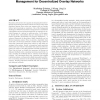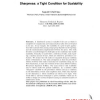732 search results - page 113 / 147 » A Formal Model of Provenance in Distributed Systems |
DC
2007
14 years 9 months ago
2007
We present a randomizedself-stabilizing leaderelection protocol and a randomizedself-stabilizing token circulation protocol under an arbitrary scheduler on anonymous and unidirect...
ENTCS
2007
14 years 9 months ago
2007
We define a logic EpCTL for reasoning about the evolution of probabilistic systems. System states correspond to probability distributions over classical states and the system evo...
106
click to vote
SIGSOFT
2002
ACM
15 years 10 months ago
2002
ACM
Security is a very important issue in information processing, especially in open network environments like the Internet. The Common Criteria (CC) is the standard requirements cata...
WWW
2005
ACM
15 years 10 months ago
2005
ACM
Reputation systems have been popular in estimating the trustworthiness and predicting the future behavior of nodes in a large-scale distributed system where nodes may transact wit...
SIROCCO
2008
14 years 11 months ago
2008
: A distributed system is scalable if the rate at which it completes its computation and communication tasks does not depend on its size. As an example, the scalability of a peer-t...


